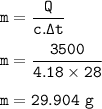
Chemistry, 19.11.2020 19:50 MyaaaMoney
What mass of water can be heated from 10.0 C to 38.0 Celsius by addition of 3,500j? (Specific heat capacity of water is 4.18 j/g C)

Answers: 3


Another question on Chemistry

Chemistry, 22.06.2019 02:00
How many moles of magnesium is 3.01 x10^22 atoms of magnesium?
Answers: 1

Chemistry, 22.06.2019 03:30
Melting and boiling are endothermic processes. this means that these processes absorb energy from their surroundings in order to occur. use this information and the data you collected in the phase change gizmo to describe what happens to the temperature of water when you boil it, then explain why this result occurs.
Answers: 2

Chemistry, 22.06.2019 16:20
When water dissolves sugar, which process is not involved? o dissociation o hydration o surface area of the solute increases sa
Answers: 1

Chemistry, 22.06.2019 20:00
There are two steps in the usual industrial preparation of acrylic acid, the immediate precursor of several useful plastics. in the first step, calcium carbide and water react to form acetylene and calcium hydroxide: cac2 (s) + 2h2o (g) → c2h2 (g) + caoh2 (s) =δh−414.kj in the second step, acetylene, carbon dioxide and water react to form acrylic acid: 6c2h2 (g) + 3co2 (g) + 4h2o (g) → 5ch2chco2h (g) =δh132.kj calculate the net change in enthalpy for the formation of one mole of acrylic acid from calcium carbide, water and carbon dioxide from these reactions. round your answer to the nearest kj .
Answers: 3
You know the right answer?
What mass of water can be heated from 10.0 C to 38.0 Celsius by addition of 3,500j? (Specific heat c...
Questions




Social Studies, 17.04.2020 22:15

Mathematics, 17.04.2020 22:15

Social Studies, 17.04.2020 22:15







Chemistry, 17.04.2020 22:15

Mathematics, 17.04.2020 22:16

English, 17.04.2020 22:16

Mathematics, 17.04.2020 22:16

History, 17.04.2020 22:16



Law, 17.04.2020 22:16





